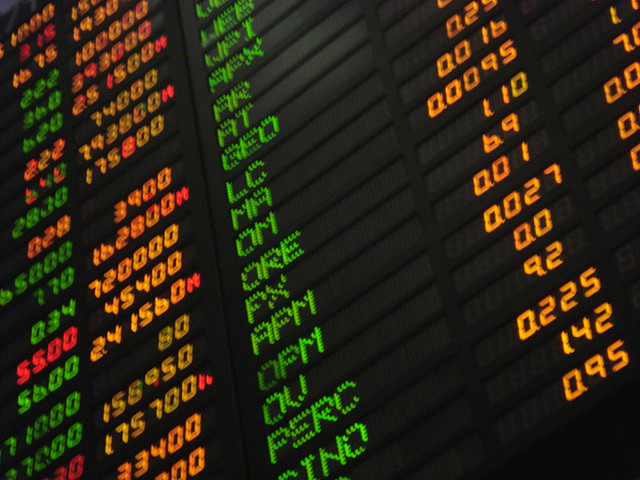Stressing over the financial market
Interview with
This week, Cambridge scientists discovered that chronic stress makes people much less  likely to take risks which could have a depressing effect on the stock market. Chris Smith was joined by John Coates from the Judge Business School to find out more...
likely to take risks which could have a depressing effect on the stock market. Chris Smith was joined by John Coates from the Judge Business School to find out more...
Chris - Why were you doing this?
John - Well, I'm a former trader myself. I worked on Wall Street for about 13 years and I really had a strong hunch while working there during some periods of financial turmoil that the bodies of traders were playing a far bigger role in the decisions they made than economics and finance had really appreciated. So, there's this belief in finance and economics that financial decision making is a purely cognitive activity, I don't think it is. I think risk taking involves our entire body and brain working together. So, we're looking at the way, things like stress hormones affect financial risk taking.
Chris - When you first began looking at this, it was actually the time of the global financial crisis in 2007 -2008. You said that perhaps stress may have a long term dampening effect on markets. Is that what you were exploring in this new publication?
John - Yeah. We've been doing a series of studies. We're trying to combine field work with lab work, which is a spectrum of studies that you get in mature biological science. You don't find that so much in economics. But in the field work we've been conducting on trading floors in the city of London where we've been sampling stress hormones from traders, we found in one of these studies that when the volatility went up in the market, in other words, uncertainty went up in the market, stress hormones followed it almost tick for tick. In one of these studies, stress hormones in the trading floor was 68% over a 2-week period as the volatility of the market increased. We sort of asked ourselves, me and my colleagues in the department of medicine at Cambridge said 68% increase in cortisol over 2 weeks, that's going to start having effects on the brain and the body. So, what we did is we went back to Addenbrookes Hospital and we replicated that hormone profile in a group of volunteers. Gave them a risk taking task and what we found is that the chronic stress caused their risk preferences to more or less collapse.
Chris - What was the hormone that you were manipulating?
John - It was cortisol which is the main stress hormone produced by the adrenal glands which sit on top of your kidneys.
Chris - So, you elevate the cortisol levels in this group of volunteers who are not traders in this instance. They're just normal volunteers and you're saying that their choice of whether they want to take a risk or not changes in response to that elevated cortisol.
John - Correct.
Chris - In what way does it change?
John - They become much more risk averse. When given the opportunity to choose between gambles, in other words, if you had a choice between flipping a coin which will give you 100 pounds if head came up zero if zero came up, your expected return from that gamble is 50 pounds. If people would prefer to take 25 pounds for certain rather than play that game, then they're very risk averse. And so, you can measure people's risk preferences by the amount of money they would take for certain rather than take chances on making a lot more money. We found that under placebo conditions, people would say on one bet would prefer 40 pounds for certain and then when they were chronically stressed, that might drop down to 25 pounds. So, they're becoming very much more risk averse.
Chris - So, this suggests that these people at Addenbrookes Hospital, if their performance were extrapolated to what's going on in the stock market, then traders may be becoming a lot more risk averse under high volatility, high market uncertainty conditions. So, what would be the long term impact on the markets then?
John - Well, we think what happens is volatility and uncertainty in the markets spikes most dramatically during crisis. We think what happens is that this mechanism that we've uncovered, this effect of chronic stress - not acute, but chronic stress in promoting risk aversion, it may be a physiological mechanism that morphs a bare market into a crash or a crisis. So that for example during the credit crisis a few years ago when volatility spiked to astronomical levels and stayed there for a year and a half. We think the financial community, under the influence of stress hormones became pathologically risk averse. They just would not buy risk assets no matter how attractive they became. That meant that the financial community could no longer perform the task allotted to it which is to buy cheap assets and stabilise the markets. They couldn't do it. The central banks had to step in and do it for them with these quantitative easing programmes.
Chris - Does this mean then that before I make an investment on the stock market, I should be phoning up my broker and asking for a sample of testosterone and also for a sample of saliva to look for their cortisol, to see whether they're likely to make risky bets or not?
John - Well, there are probably other way to doing it, but I mean, it sounds farfetched, but to tell you the truth, this is what sports physiologists do all the time with their athletes.
- Previous Building a Mars Rover
- Next Washing your Hands!









Comments
Add a comment